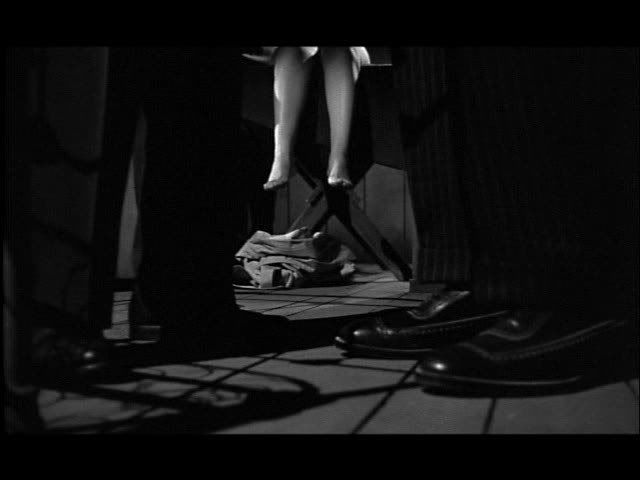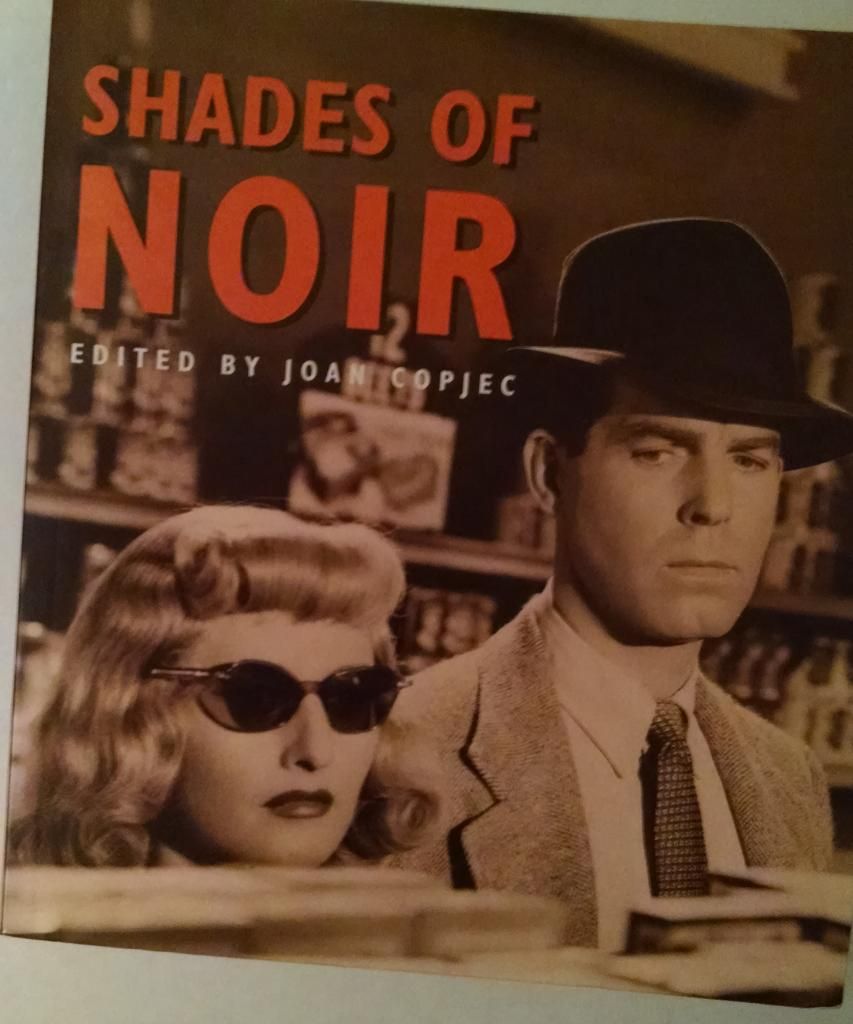Skip to comments.
More On Noir and Two Additional Silents You Should See
Chronicles ^
| January 09, 2015
| Ray Olson
Posted on 01/11/2015 7:45:13 PM PST by Pelham
By:Ray Olson | January 09, 2015
One responder to my previous post, “Notes on noir”, asked why so many movies are called film noir when, by my lights, they’re not. The simple, somewhat cheeky answer is “brand creep”: film noir is a bankable label for a crime movie, so it’s come to be liberally applied. More to the point is that professional film critics by and large don’t use as restrictive a definition of noir—viz., that the form tells stories “about little guys and gals getting a raw deal in a world that never gives them an even chance”—as mine, preferring film-stylistic rather than literary-dramatic criteria to establish what’s noir. They’re perfectly entitled to do so, of course, though the characteristics of cinematography, acting, dialogue, and music so important to them I like to think of not as essentials but as “highly welcome complements.”
Very similar stylistic elements figure in many movies made during the heyday of noir in the 1940’s and ’50’s. Moreover, those elements are used to conjure the Weltanschauung of noir. The collaborations of director Sam Wood and production designer William Cameron Menzies (who coined his own job title on Gone with the Wind) look more noir than the vast preponderance of the real McCoy. But would anyone be comfortable calling the romantic comedy, The Devil and Miss Jones (1941); the small-town exposé, Kings Row (1943); and the profile of baseball great Lou Gehrig, Pride of the Yankees (1943), film noir?
Still, to pick a glorious f’r-instance, the devastating last shot of Pride is as cosmically fatalistic as any in the whole corpus of the definitively noir director-cinematographer team of Anthony Mann and John Alton. Gehrig has just said his famous farewell speech (“. . . today I consider myself the luckiest man on the face of
(Excerpt) Read more at chroniclesmagazine.org ...
TOPICS: Arts/Photography; TV/Movies
KEYWORDS: filmnoir
Navigation: use the links below to view more comments.
first 1-20, 21-24 next last
A second Chronicles blog on film noir
1
posted on
01/11/2015 7:45:13 PM PST
by
Pelham
To: Pelham
“One responder to my previous post, “Notes on noir”, asked why so many movies are called film noir when, by my lights, they’re not. The simple, somewhat cheeky answer is “brand creep”: film noir is a bankable label for a crime movie, so it’s come to be liberally applied.”
I thought Citizen Kane was long regarded as a pioneer vehicle for film noir in America (it’s a bio-pic melodrama, not a crime film). And the German expressionist film before that included fantastic elements (the sort found in Sci-Fi, Fantasy, or Horror films).
2
posted on
01/11/2015 8:06:35 PM PST
by
a fool in paradise
(Shickl-Gruber's Big Lie gave us Hussein's Un-Affordable Care act (HUAC).)
To: Pelham
Film Noir to me are dark and brooding with seriously flawed and conflicted protagonists, often scratching and clawing to stay even. And then there’s the Dames ... can’t forget the Dames.
Many can list the classics, but how about the more contemporary
I’’m no expert but I would like to see others list some of their own contemporary Film Noir.
Chinatown — Too bad it was in color.
Bladerunner — They managed to do it with dark and brooding atmospheric color. I don’t consider it dystopian more than I consider it Film Noir.
Dark City — The reverse of Blade Runner, more Dystopia than Film Noir.
L.A Confidential — barely registers as Film Noir in my book.
Basic Instinct — would have been great without Jennifer Lopez
The American — Clooney for the win — unless it’s politics.
Body Heat — I’m still angry.
3
posted on
01/11/2015 8:07:05 PM PST
by
Usagi_yo
(Coming events caste their shadow beforehand.)
To: Usagi_yo
made a mistake. Basic Instinct didn’t have Jennifer Lopez, that’s another film that shouldn’t even be on a list of potential film Noir.
Out of sight.
4
posted on
01/11/2015 8:08:34 PM PST
by
Usagi_yo
(Coming events caste their shadow beforehand.)
To: Pelham
5
posted on
01/11/2015 8:10:27 PM PST
by
P.O.E.
(Pray for America)
To: Pelham
Good article. Thanks for the post!
6
posted on
01/11/2015 8:15:35 PM PST
by
JennysCool
(My hypocrisy goes only so far)
To: Pelham
“Double Indemnity” Best noir in my book.
7
posted on
01/11/2015 8:15:48 PM PST
by
Huskrrrr
To: P.O.E.
D.O.A. ‘nuff said :)Great movie, if you're talking about the original. Everyone involved with the dreadful 1980s remake should be shot.
Another classic: The Big Clock, with Ray Milland.
To: Pelham
More to the point is that professional film critics by and large don’t use as restrictive a definition of noir—viz., that the form tells stories “about little guys and gals getting a raw deal in a world that never gives them an even chance”—as mine, preferring film-stylistic rather than literary-dramatic criteria to establish what’s noir. They’re perfectly entitled to do so, of course, though the characteristics of cinematography, acting, dialogue, and music so important to them I like to think of not as essentials but as “highly welcome complements.” Sounds more like a hijack of the term "film noir" which at its core is defined by film technique, not story elements.
The elements under discussion are more of a dime-store paperback trade than pulp or the crime films of the 30s (which focused in the pre-code era on the rise and fall of gangsters).
Paperback fiction (whether the books were originally hardcover or not is irrelevant) can be typified by Mickey Spillane and other crime novelists.
Even Mike Hammer's Kiss Me Deadly wouldn't fit the blogger's definition of film noir.
I find this image to be both noir and the embodiment of a dimestore paperback cover.

9
posted on
01/11/2015 8:21:05 PM PST
by
a fool in paradise
(Shickl-Gruber's Big Lie gave us Hussein's Un-Affordable Care act (HUAC).)
To: Pelham
A GREAT READ ON THE SUBJECT

10
posted on
01/11/2015 8:40:44 PM PST
by
Huskrrrr
To: Usagi_yo
Body Heat is a great modern noir. Probably my favorite. Or a tie with Blade Runner since you’re including it in your list. It certainly has the atmosphere. Sci-fi noir.
“Chinatown — Too bad it was in color.”
Ha- good point. It might be better in a stark b&w
“Basic Instinct — would have been great without Jennifer Lopez”
Did you mean Sharon Stone?
And have you ever seen ‘Hammett’? I’d include it with contemporary noir. Hard to find a copy but worth the hunt.
11
posted on
01/11/2015 8:47:07 PM PST
by
Pelham
(WWIII. Islam vs the West)
To: Lurking Libertarian
Agreed on all counts.
A while back, I was into watching some Italian giallo, which is similar in subject and execution, albeit different stylistically.
Bava’s “Blood and Black Lace” comes to mind.
12
posted on
01/11/2015 8:50:06 PM PST
by
P.O.E.
(Pray for America)
To: Huskrrrr
Good pick. The writer agrees with you in his first blog post on noir:
“The purest noirs I’ve seen so far are Double Indemnity (1944), Detour (1945), Decoy (1946), and Raw Deal (1948). “
A link to his first post:
https://www.chroniclesmagazine.org/notes-on-noir/
13
posted on
01/11/2015 8:53:50 PM PST
by
Pelham
(WWIII. Islam vs the West)
To: Pelham
14
posted on
01/11/2015 8:55:43 PM PST
by
Huskrrrr
To: Pelham
Don’t forget my favorite, Out of the Past.
15
posted on
01/12/2015 12:53:11 AM PST
by
JohnnyP
To: Pelham
Disagree about “Chinatown” the color treatment positively accented the scenes and gave a dated richness to the film
16
posted on
01/12/2015 3:36:28 AM PST
by
Jimmy Valentine
(DemocRATS - when they speak, they lie; when they are silent, they are stealing the American Dream)
To: Huskrrrr
Great picture of Double Indemnity. Another bonus was that Fred McMurray and Barbara Stanwyck were conservatives. Stanwyck grew up a poor orphan in Brooklyn New York and hated Roosevelt. She felt as if she could make a success through hard work, others could as well. I imagine it must have been hard for someone of her background to be preached to by a guy who was born with a silver spoon in his mouth (FDR) about how to help the poor...
To: Old Teufel Hunden
I didn’t know that about Barbara Stanwyck, thanks. One can only imagine the conversations she must have had with Fred McMurray between scenes.
18
posted on
01/12/2015 6:49:47 AM PST
by
Huskrrrr
To: Huskrrrr
"One can only imagine the conversations she must have had with Fred McMurray between scenes."
I believe they became lifelong friends. The Christmas movie they did together (Remember the Night) is a really good movie IMO also.
To: Huskrrrr
Another thing about Stanwyck is that her and hubby Robert Taylor testified at HUAC as a friendly witness testifying about all of the communistic influences in Hollywood. Taylor was another good conservative. But those were different times. A time when Hollywood had a lot of it’s top stars, producers and directors as Conservatives.
Navigation: use the links below to view more comments.
first 1-20, 21-24 next last
Disclaimer:
Opinions posted on Free Republic are those of the individual
posters and do not necessarily represent the opinion of Free Republic or its
management. All materials posted herein are protected by copyright law and the
exemption for fair use of copyrighted works.
FreeRepublic.com is powered by software copyright 2000-2008 John Robinson

